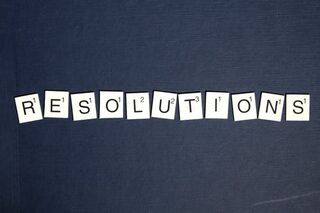Coronavirus Disease 2019
New Year's Resolutions: The COVID-19 Edge
As with so many other things this year, New Year's resolutions need a reset.
Posted December 11, 2020

With the imminent turn of the year, we might wish that the coronavirus could read the calendar and turn over a new leaf, but alas….
Looking forward to 2021, then, how does an athlete—or other performer—go about making New Year’s resolutions? With all the uncertainty surrounding us into this upcoming year, our standard plans probably need a shake-up.
Let’s consider three different athletes. I’ll call them the three "C"s, each an amalgam of a number of athletes I know or know of. How might they go about planning for this new year?
- Connor is a high school soccer player/baseball pitcher. He loves the sport. He’s been frustrated, disappointed, and overwhelmed at times because of the on-again/off-again opportunities to practice or even play.
- Calvin is a university basketball player/an elite cyclist who was preparing for the 2020 Olympic games/a professional rower. His life and expectations have been turned utterly upside down.
- Christopher is a recreational jogger/committed runner. He was stunned when spring marathons were postponed and then canceled for the fall and then…who knows when the next actual marathon will occur?
Just to broaden the descriptions, what if, instead of Connor, Calvin, and Christopher, I’m describing the impact on Connie, Carol, or Christine? What if one of them is LGBTQ? Or (in the spirit of intersectionality), what if any of the above are BIPOC [Black, Indigenous, or a Person of Color]?
There are of course many other potentially relevant elements, such as any of the "C"s' own history, attitudes and beliefs, life circumstances, support, community, level of pandemic spread in their community, and their own physical vulnerability, as well as their attitudes and compliance with public health and jurisdictional regulations.
In part, I’m drawing on an article that describes the initial experiences of elite athletes during this past spring. The article will be published in an upcoming issue of The Sport Psychologist. This information may help us reflect on what we too have dealt with as well as think about how to go about planning. Additionally, these athletes' experiences can help us feel some sense of community and less alone with these challenges.
It may be useful to think about this past year in terms of phases. Whitcomb-Khan and her colleagues focused on the “initial critical pause,” when everything came to a screeching halt last spring.
Subsequently, for many athletes (and everyone else) during the summer and early fall 2020, it seemed like restrictions could be lifted. And then a cascade of confusing limits during this fall added yet more uncertainty and a sense of unpredictability.
The initial pause, with Olympic Games postponed for a year while other events were outright canceled, meant that the athletes in this study lost contact with friends and teammates, felt pressure around staying fit in a totally different atmosphere and without support, and were acutely aware of their lack of control around practice and competition.
Also, there was a strong sense of loss: of their athletic conditioning, their athletic identity, their routine…and for some, motivation.
By way of overcoming some of these experiences and feelings, they commented on coming to terms with the situation, developing some new activities, and developing new structures and routines in their lives. For some, the time off allowed for the physical recovery of stressed bodies and then actual physical improvement. They experienced a new appreciation for their sport.
Here are some general thoughts about crafting your New Year’s resolutions, whether you are one of the 3 "C"s or not.
It’s fundamentally important to know about motivation and goal setting, like setting SMART goals that include paying attention to the process and not just the planned or wished-for outcome.
Recognizing those basics, it’s also different this year. This is an opportunity for a reset:
- What is your “why?” Why are you making these plans now? How will meeting your resolution(s)—or not—impact you or the people that matter to you?
- After nearly a year, what have you learned about yourself, your goals, what motivates you, your life circumstances, opportunities, and limits? The “return to normal” is not going to happen very soon.
- Don’t expect to be able to pick up where you left off. Your life has changed. This involves being gentle with yourself, what you have been through, what you see as your prospects. If that’s hard to do, you might think about “what if I had a friend who…” had the year that you have had: what would you advise them?
- With all the uncertainty and changes that we’ve experienced, what have you learned about your most productive ways of coping? And yes, that may (and probably should) include some time out, spacing out…recovery.
- What aspects of your health and fitness have changed? Are there some positives that you can draw from?
- And always (constant drumbeat): Maintain all health measures. At a minimum, mask up, maintain a 6-foot distance, and wash your hands frequently. That advice isn’t going to change until some level of hive immunity occurs.
And so, back to our 3 "C"s:
- Connor has learned a tremendous amount about flexibility and adjusting to change. While saddened at all that he’s missed, he feels more balance in his life. He recognizes that his soccer goals at this point turn more to enjoyment, a sense of community, and an appreciation of the development of skills.
- Calvin’s situation is of course much more specific. For example, did the cancellation of the 2020 Olympics give him another year to train or did he know that 2020 would be the last year that he could have Olympic aspirations, that his body was wearing out? This past year has been a total game-changer. His resolutions will be markedly different from a year ago.
- Christopher has the opportunity to really reflect, pay attention to all his life circumstances, train as he chooses, and recognize that he can only control what he does, not what organizations decide. Perhaps he’s found a different form of physical activity that isn’t as tied to those kinds of decisions. Or perhaps his resolutions for this year are ones of maintenance, without expectations. Perhaps he’s thinking about how he might work within his community to help engage others in his love of running.
Whatever your goals and resolutions for this coming year are, I wish that you will be well—and that you stay safe.
References
Whitcomb-Khan, G., Wadsworth, N., McGinty-Minister, K., Bicker, S., Swettenham, L., & Tod, D. (in press). Athletes’ stories of lockdown during COVID-19.




